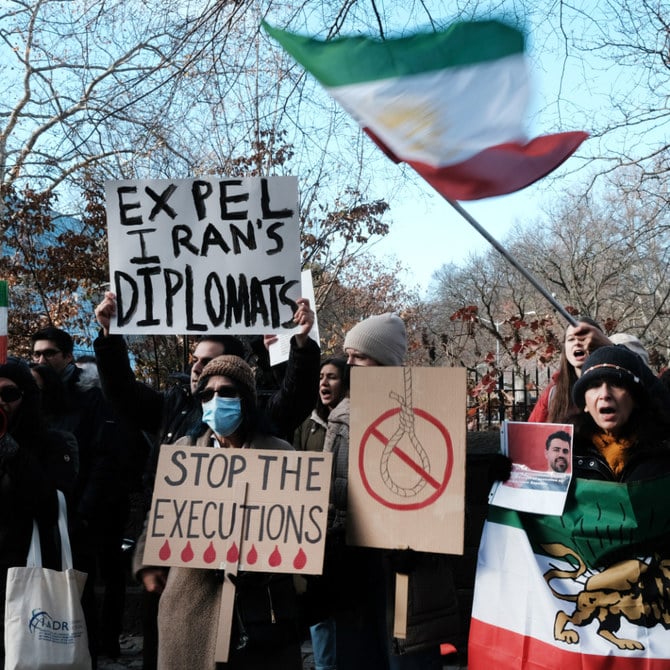
- ARAB NEWS
- 02 May 2024

Arab News
JEDDAH: Iran’s currency fell to a record low against the dollar on Sunday, with nationwide anti-government protests now in their third month.
A breakdown in negotiations to restore Tehran’s nuclear deal has also hurt the value of the rial.
Traders in Tehran were exchanging the rial at around 370,000 to the dollar on Sunday, up from 368,000 on Thursday.
Iran’s currency was trading at 32,000 rials to the dollar at the time of the 2015 nuclear accord that dropped international sanctions in exchange for tight controls on Iran’s nuclear program.
Iran has been gripped by nationwide protests since September.
Demonstrations broke out following the death of 22-year-old Mahsa Amini in the custody of the country’s morality police.
The poor state of Iran’s economy is also another factor driving the protests,
Rights groups warned that several people were on Sunday at risk of imminent execution over the protests after an international backlash over Iran’s first hanging linked to the movement.
Iran’s judiciary has reported that 11 people received death sentences so far in connection with the protests, but campaigners say around a dozen others are facing charges that could see them also receive the death penalty.
Unless foreign governments “significantly increase” the diplomatic and economic costs to Iran, the world “is sending a green light to this carnage,” said Hadi Ghaemi, executive director of the New York-based Center for Human Rights in Iran.
Amnesty International said Iran was now “preparing to execute” Mahan Sadrat, 22, just a month after his “grossly unfair” trial.
He was convicted of drawing a knife in the protests, accusations he strongly denied in court.
On Saturday, Sadrat was transferred from Greater Tehran Prison to Rajai Shahr Prison in the nearby city of Karaj, “sparking concerns that his execution may be carried out imminently,” Amnesty said.
“Like all other death row prisoners, he was denied any access to his lawyer during the interrogations, proceedings and show trial,” said another group, Oslo-based Iran Human Rights.
Amnesty warned the life of another young man arrested over the protests, Sahand Nourmohammadzadeh, was also at risk “after a fast-tracked proceeding which did not resemble a trial.”
He was sentenced to death in November on accusations of “tearing down highway railings and setting fire to rubbish cans and tires,” the group said.
Among others given the same sentence is Saman Seyedi, 24, from Iran’s Kurdish minority. His mother pleaded for his life on social media in a video.
“Protester executions can only be prevented by raising their political cost” for the regime, IHR director Mahmood Amiry-Moghaddam said, calling for a “stronger than ever” international response.
Another dissident, Toomaj Salehi, who expressed support for anti-regime protests, is charged with “corruption on earth” and could face a death sentence, Iranian judicial authorities confirmed last month.
“We fear for the life of Iranian artists who have been indicted on charges carrying the death penalty,” UN experts said in a statement, referring to the cases of Sayedi and Salehi.
Amnesty and IHR have also raised the case of Hamid Gharehasanlou, a medical doctor sentenced to death.
They say he was tortured in custody and his wife was coerced into giving evidence against him which she later sought to retract.
The US, EU members and UK strongly condemned the execution of Mohsen Shekari.
German Foreign Minister Annalena Baerbock said it showed a “boundless contempt for human life.”
with soaring prices, high unemployment and corruption a common complaint among protesters.